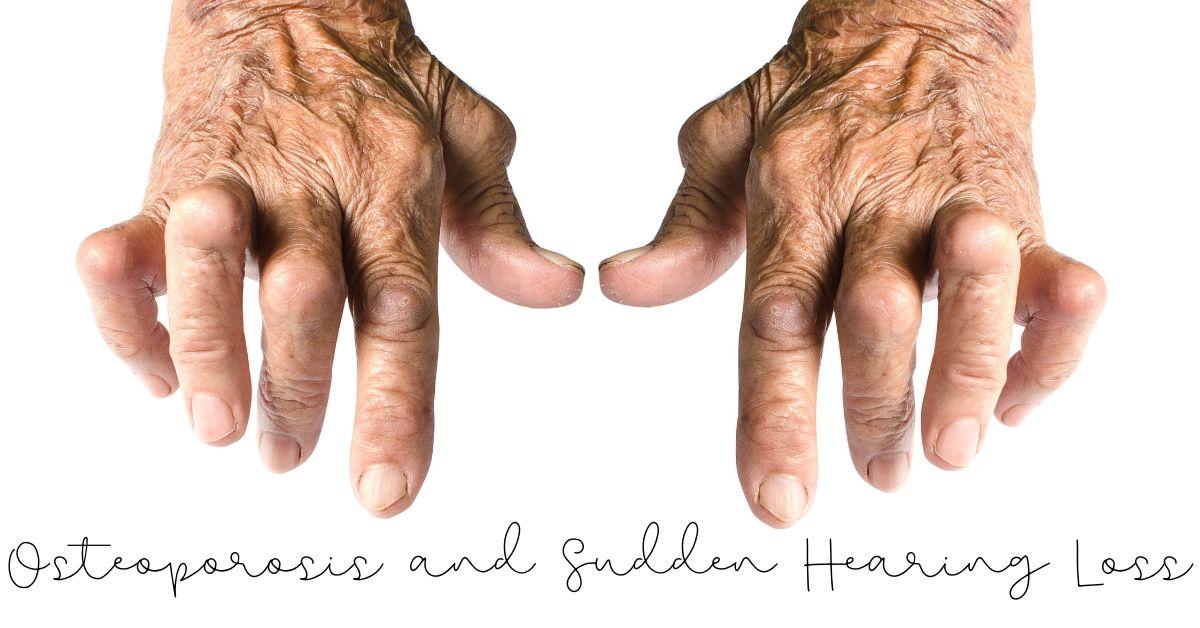
- Exploring the Genetic Landscape of Hearing Loss: Understanding the Role of Genetics - April 15, 2024
- The Hazards of Pretending to Hear - March 25, 2024
- Navigating the World of Cochlear Implants: A Comprehensive Guide - March 15, 2024
Osteoporosis—which literally means porous bone—is a bone density disease in which the density and quality of bone are reduced. It affects about 54 million Americans. As bones become more porous and fragile, the risk of fracture is greatly increased. The loss of bone occurs silently and progressively. Often there are no symptoms until the first fracture occurs. (International Osteoporosis Foundation)
Hearing loss affects millions of Americans—48 million by a Hearing Loss Association of America (HLAA) estimate. One type of disabling hearing loss is called Sensorineural Hearing Loss and is defined as a loss greater than 30 decibels (dB) in three contiguous frequencies, occurring over a period of less than three days.
But how are osteoporosis and hearing loss connected?
Osteoporosis and Bones of the Middle Ear
Osteoporosis can affect the ossicles, the three tiny bones in the middle ear: the hammer (malleus), the anvil (incus) and the stirrup (stapes), one of the smallest bones in the body. Those bones transmit sounds from the outer ear to the inner ear and when they are damaged by osteoporosis, it can cause hearing loss. An imbalance in bone formation and bone resorption due to osteoporosis can also lead to a hearing loss.
Studies Link Osteoporosis and Hearing Loss
According to an American study, “A significant association between osteoporosis and hearing loss: a systematic review and meta-analysis,” found that osteoporosis was significantly associated with hearing loss despite nationality, age, and gender. The condition is also more common among people who are older, are underweight and/or smoke.
The study, published in the Brazilian Journal of Otorhinolaryngology, was a structured review and meta-analysis of 16 articles. The study conducted eight studies involving 52,828 participants who had osteoporosis and their hearing status evaluated. The studies were carried out in America, Turkey and Korea and the participants were 18 years old or older.
A Korean study published in The Journal of Clinical Endocrinology & Metabolism found that people with osteoporosis have a 40 percent increased risk of developing sudden sensorineural hearing loss compared to people without the degenerative condition.
The study worked with patients identified through the Korean Health Insurance Review and Assessment Service National Patient Sample data. It analyzed data from 68,241 patients aged at least 50 years with a diagnosis of osteoporosis between 2002 and 2013 that were matched with a control group without osteoporosis.
The researchers found that 0.8 percent of participants with osteoporosis and 0.5 percent of adults in the control group without the condition experienced sudden sensorineural hearing loss. That is a 40 percent increased risk of developing sudden sensorineural hearing loss.
It was also found that the risk of sudden sensorineural hearing loss in cases of osteoporosis increases with age. Analysis of subgroups found that men and women aged 50 to 60 years old with osteoporosis both were at a greater risk for hearing loss. With adults aged at least 60 years and those aged at least 70 years, this risk persisted solely in women.
Seeking Treatment for Hearing Loss
Studies have shown a connection between osteoporosis and sensorineural hearing loss. Osteoporosis is a degenerative condition that over time can affect the tiny bones of the middle ear, known as the ossicles, and lead to hearing loss. Hearing loss affects over 48 million Americans and 466 million people worldwide, making it one of the most common medical conditions affecting a given population.
When the ossicles can no longer transmit sound from the outer ear to the inner ear, a hearing loss is present. At Beverly Hills Hearing Center, we’re here to help. If you’ve noticed a sudden change in your hearing, contact us immediately for a check-up and hearing exam. We will administer the hearing exam and provide a thorough assessment of each ear’s hearing ability.
As with many other medical conditions, hearing loss, if left untreated, can lead to a slew of other health issues, including social isolation and depression, mental fatigue and cognitive decline, and even Alzheimer’s disease and dementia. It can strain relationships with friends and family and put your career in jeopardy.
Beverly Hills Hearing Center
Let us know if you have osteoporosis when you schedule your appointment. This will allow us to be better prepared to provide you with the best possible solutions suited to your needs. Though there is no known cure for hearing loss, it is important to your overall health to seek treatment at the first sign. Contact us today to learn more!
